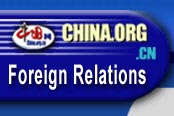Colin Powell, the next US secretary of state, has fleshed out the "uniquely American internationalism" of his new boss, president-elect George W. Bush. It is a doctrine of robust but wary engagement with China and Russia, a tougher line on Iraq and a commitment to controversial missile defences.
Mr Powell, formally named on Saturday by Mr Bush as his choice for the top diplomatic post, said the administration would not be turning its back on the world - an apparent effort to dilute the isolationist tag pinned on the Republicans in a bruising election campaign.
He promised America would lead by "being engaged with the world" rather than "using our strength and position of power to get back behind our walls".
Mr Powell said traditional alliances would form the centre of American policy - relationships that are expected to include Japan, Taiwan and South Korea as well as Europe. "We will work also with those nations in the world that are transforming themselves - nations such as China and Russia," he said.
"We will work with them not as potential enemies and not as adversaries, not yet as strategic partners, but as nations that are seeking their way. We will have areas of agreement and areas of difference and we will discuss them in rational ways, letting them know of our values, letting them know of the principles that we hold dear."
On the campaign trail, Mr Bush repeatedly stressed that America must be more judicious in its use of military force overseas and must avoid being seen as the "Ugly American".
Mr Powell promised reviews of peacekeeping commitments, but insisted America would play to its strengths and "stand strong" in dealing with terrorists and rogue regimes. "That strength comes to us from the power of our system, the democracy and the free enterprise system. It comes to us from our economic power. It comes to us from our military power," he said.
He added that the Bush administration would push plans for a comprehensive missile defence shield, which will anger Beijing and Moscow. They claim it will spark a new arms race.
The Clinton administration has been testing a limited proposal, but Mr Bush has demanded studies into the most modern, extensive system possible, even a possible update of former president Ronald Reagan's concept of laser weapons.
Many insiders believe the scheme may prove an early victim of the recent election crisis, noting it may not have enough support from Democrats. Mr Powell said he was determined to push ahead, warning it was vital to "lower the currency" of offensive missiles. He promised international discussions.
Mr Powell said he wanted to intensify the sanctions pressure on Saddam Hussein's Iraq, defeated by American-led forces during the Gulf War - the major success of his time as chairman of the joint chiefs of staff under former president George Bush.
Beijing did not react to General Powell's nomination, but Ambassador Li Zhaoxing said he was confident economic relations between China and the US would improve. Guo Zhenyuan, a member of government think-tank the China Institute of International Issues, said: "The bottom line is that relations between the US and the mainland are always more important than relations between the US and Taiwan."
(China Daily 12/18/2000)
